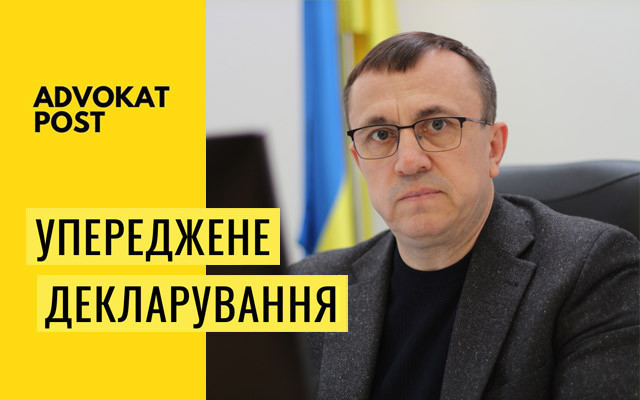
Attorneys' declarations: what does the changing position of the NAPC indicate?

When the Constitutional Court began to consider the case on the submission of declarations by representatives of the bar's disciplinary bodies, the National Agency for the Prevention of Corruption declared a constitutional crisis and threats to the entire declaration system. But earlier, officials had a completely different opinion on this issue.
Serhiy Vilkov, the Head of the High Qualification and Disciplinary Commission of the Bar, drew attention to this in an interview with AdvokatPost.
As a reminder, we are referring to the updated 2019 version of subparagraph «c» of paragraph 2 of part 1 of Article 3 of the Law «On Prevention of Corruption», according to which representatives of public associations, scientific institutions, educational institutions, experts with relevant qualifications, and other persons who are members of competition and disciplinary commissions established in accordance with the Law on Civil Service, the Law on Service in Local Self-Government Bodies, and other laws were equated with persons authorized to perform state or local government functions.
Interpreting this provision in such a way that the members of the QDCB became subjects of declaration, the NAPC started sending notifications to lawyers about the fact of failure to submit a declaration and the obligation to submit it. Oksana Bukhtoyarova, a member of the QDCB in Zakarpattya region, appealed one of these notifications to the court. Since the Supreme Court eventually removed itself from the issue of whether lawyers are subject to declaration, she filed a constitutional complaint.
When updating the Knowledge Base in November last year, the NAPC explicitly named members of the HQDCB and the State Enterprise QDCB as subjects of declaration (see paragraph 44-1 of the clarifications).
S. Vilkov noted that the National Agency for the Prevention of Corruption had previously given the opposite explanation under the same wording of Article 3 of the Law «On Prevention of Corruption». «Earlier, the agency recognized that the bar is an independent civil society institution whose activities are not related to the performance of state or local government functions. State authorities cannot interfere in its work, - reads the explanation provided at the request of the Ukrainian National Bar Association. - And filing a declaration is a form of state control over the integrity of persons performing state or local government functions. Therefore, imposing a declaration obligation on a person who is not authorized to perform such functions may be considered as interference with the private and family life of that person», the Head of the HQDCB stated the initial position of the agency.
When asked by a journalist how to determine the correct interpretation of a disputed provision, S. Vilkov replied that the law should always be followed, citing the provisions of Part 2 of Article 2 of the Law «On Prevention of Corruption»: «if the provisions of this Law or other legislative acts in the field of corruption prevention allow for ambiguous (multiple) interpretation of the rules on the rights and obligations of persons covered by this Law, the most favorable interpretation of the rule for such persons shall be applied».
During the interview, he also noted that multiple interpretations of a disputed provision directly contradict the principle of legal certainty, which is a component of the rule of law.
The full text of the interview with S. Vilkov, the Head of the HQDCB, is available at the link.
© 2026 Unba.org.ua Всі права захищені
"Національна Асоціація Адвокатів України". Передрук та інше використання матеріалів, що розміщені на даному веб-сайті дозволяється за умови посилання на джерело. Інтернет-видання та засоби масової інформації можуть використовувати матеріали сайту, розміщувати відео з офіційного веб-сайту Національної Асоціації Адвокатів України на власних веб-сторінках, за умови гіперпосилання на офіційний веб-сайт Національної Асоціації Адвокатів України. Заборонено передрук та використання матеріалів, у яких міститься посилання на інші інтернет-видання та засоби масової інформації. Матеріали позначені міткою "Реклама", публікуються на правах реклами.